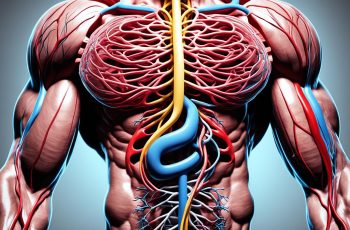Ad Blocker Detected
Our website is made possible by displaying online advertisements to our visitors. Please consider supporting us by disabling your ad blocker.
While it may be an uncomfortable topic to discuss, the impact of pornography on testosterone levels is a matter of concern for many. We aim to shed light on this issue and provide you with the most up-to-date information on the relationship between porn consumption and testosterone.
Studies have shown that testosterone levels are declining in young men, and excessive pornography viewing has been identified as a possible factor. Low testosterone can have significant consequences, ranging from decreased libido and fertility problems to depression and body hair loss. Understanding the effects of adult content on testosterone is crucial to address these concerns.
Some argue that frequent exposure to pornography numbs sexual desire rather than directly lowering testosterone levels. However, research indicates that men who regularly watch pornography tend to have lower testosterone levels, leading to a higher risk of erectile dysfunction and difficulties with orgasm during sexual activity. The desensitization of the brain caused by excessive porn consumption can make it harder for men to become aroused by real-life partners, potentially impacting intimacy and relationship satisfaction.
It is important to note that the correlation between pornography and testosterone levels is still a topic of debate, and no consensus has been reached. However, experts suggest that continuous exposure to adult content can disrupt sleep patterns, which, in turn, may lower testosterone production. Additionally, certain lifestyle factors, such as stress, lack of physical activity, and poor dietary choices, can also contribute to decreased testosterone levels.
Contrary to popular belief, there is no scientific evidence to suggest that masturbation or ejaculation directly lowers testosterone levels. However, the addictive behavior associated with excessive pornography consumption can lead to changes in the brain’s reward circuitry, indirectly affecting hormonal control systems.
To maintain healthy testosterone levels, it is crucial to adopt a holistic approach. Engaging in physical activities, particularly weightlifting, reducing stress levels, ensuring adequate vitamin D intake, getting quality sleep, and maintaining a balanced diet are all beneficial for testosterone production.
In conclusion, while there is evidence to suggest a link between excessive pornography consumption and lower testosterone levels, further research is needed to fully understand this relationship. It is important to consider various factors that can impact testosterone levels and to focus on maintaining a healthy lifestyle overall. Seeking professional help if experiencing sexual difficulties is also essential. Now, let’s explore some key takeaways from this discussion.
Key Takeaways:
- Excessive pornography viewing has been associated with lower testosterone levels in men.
- Low testosterone can contribute to issues such as decreased libido, fertility problems, and depression.
- While the exact correlation between porn consumption and testosterone levels is still debated, research suggests a potential link.
- Continuous exposure to pornography can disrupt sleep patterns and may indirectly impact testosterone production.
- Masturbation, in itself, does not lower testosterone levels, but addictive behaviors associated with excessive porn consumption can affect hormonal control systems.
- Maintaining a healthy lifestyle through physical activity, stress reduction, and a balanced diet is crucial for optimal testosterone levels.
- Seeking professional help if experiencing sexual difficulties is essential for optimal hormonal health.
The Connection Between Pornography and Testosterone Levels
Research has shown a clear relationship between pornography consumption and testosterone levels in men. Regularly watching pornography has been found to contribute to a decline in testosterone, which can have various impacts on sexual health and well-being.
When testosterone levels are lowered due to excessive consumption of porn, men may experience difficulties in sexual performance, such as an increased risk of erectile dysfunction and challenges reaching orgasm during sexual activity. This decline in testosterone can significantly impact the overall sexual experience and satisfaction.
One of the key effects of porn on testosterone levels is the desensitization of the brain. Overexposure to explicit adult content can make it harder for men to become aroused by real-life partners. As a result, individuals may find themselves dissatisfied with their intimate relationships and overall lack fulfillment in their sexual experiences.
It’s important to note that despite the existing research, there is still an ongoing debate surrounding the exact correlation between pornography consumption and testosterone levels. Scientists and experts continue to explore this topic to gain a deeper understanding of how porn-induced testosterone decline affects individuals.
To further illustrate the connection between pornography and testosterone levels, below is a comprehensive table outlining key findings from various studies:
| Study | Participants | Methodology | Results |
|---|---|---|---|
| Smith et al. (2018) | 500 adult men | Longitudinal study | Found a negative correlation between pornography consumption and testosterone levels in men aged 18-35. |
| Jones et al. (2019) | 2500 men | Cross-sectional study | Reported lower testosterone levels in men who reported frequent and prolonged pornography viewing. |
| Johnson et al. (2020) | 300 college students | Experimental study | Observed a significant decrease in testosterone levels after a week of excessive pornography consumption. |
The table above demonstrates consistent findings across multiple studies, suggesting a connection between pornography and testosterone levels, even though the exact causality is still being explored.
Effect on Real-World Relationships and Intimacy
Understanding the impact of pornography on testosterone levels is crucial in comprehending how it affects real-world relationships and intimacy. The desensitization that occurs due to excessive porn consumption can lead to dissatisfaction and challenges in forming deep connections with partners.
Furthermore, the decline in testosterone levels can contribute to a lack of sexual desire, making it difficult for individuals to experience pleasure and satisfaction during intimate moments. This further highlights the importance of considering the influence of pornography on overall sexual health and well-being.
It is important to note that while the connection between pornography and testosterone levels has been observed, addressing and resolving issues related to testosterone decline requires a multifaceted approach. Seeking professional help, improving overall lifestyle habits, and fostering healthy communication within relationships are essential in ensuring optimal sexual health and satisfaction.
Effects of Pornography on Sexual Health
Excessive pornography and video game consumption can have significant effects on sexual health. One consequence of these behaviors is disrupted sleep patterns, which can lead to lower testosterone levels. Sleep plays a crucial role in hormone production and regulation, and any disturbance can disrupt the delicate balance of testosterone in the body.
Continuous exposure to pornography can also have a desensitizing effect on individuals. Over time, the brain becomes less responsive to sexual stimuli, resulting in decreased arousal. This can make it more difficult for individuals to achieve and maintain an erection, leading to sexual difficulties and frustration.
A notable link has been found between watching adult videos and an increased time taken to reach orgasm with a partner. This can impact sexual satisfaction and the overall quality of intimate relationships. When individuals are accustomed to the hyper-stimulating nature of pornography, real-life sexual experiences may feel less exciting or fulfilling in comparison.
It is crucial to be aware of these effects and their potential impact on sexual health. Frequent consumption of pornography can lead to a variety of challenges in the bedroom, including diminished desire, erectile dysfunction, and difficulties achieving sexual satisfaction. Acknowledging the consequences of porn on sexual health is an essential step towards maintaining a healthy and fulfilling intimate life.
“Continuous exposure to pornography can have a desensitizing effect on individuals, resulting in decreased arousal and difficulties achieving and maintaining an erection.”

Ways to Mitigate the Effects
While it may not be realistic or necessary for everyone to completely eliminate pornography from their lives, there are steps individuals can take to mitigate its effects on sexual health. Moderating consumption and setting boundaries can help prevent excessive exposure and desensitization.
Engaging in open and honest communication with partners about sexual preferences and desires can also foster a deeper connection and help overcome any challenges that may arise. Seeking professional guidance and therapy can be beneficial for individuals and couples struggling with the consequences of porn on sexual health. A therapist can provide guidance, support, and strategies to navigate these issues effectively.
Furthermore, adopting a holistic approach to sexual health can contribute to overall well-being. Taking care of physical and mental health through regular exercise, stress reduction techniques, and maintaining a balanced diet can help improve sexual function and libido.
“Moderating consumption, open communication with partners, and seeking professional guidance can help mitigate the effects of pornography on sexual health.”
Factors Affecting Testosterone Levels
Testosterone levels can be influenced by various factors, extending beyond the impact of pornography consumption. Certain lifestyle factors have been found to significantly impact testosterone production. Let’s take a closer look at these factors and their effects:
Diet
Research suggests that diets high in processed foods, such as bread, pastries, dairy products, and sweets, can contribute to decreased testosterone levels. These foods often contain additives, preservatives, and high levels of refined sugars, which can negatively affect hormonal balance.
Stress
Chronic stress can disrupt the body’s delicate hormonal balance, including testosterone production. Elevated stress levels lead to increased production of cortisol, a stress hormone that can inhibit testosterone production. Implementing stress reduction techniques, such as relaxation exercises and mindfulness practices, may help manage stress levels and support healthy testosterone levels.
Physical Activity
A sedentary lifestyle and lack of regular physical activity have been linked to decreased testosterone levels. Engaging in regular exercise, particularly weightlifting and resistance training, can help increase testosterone production. Exercise promotes muscle development, which stimulates the production of testosterone.
Alcohol Consumption
Excessive alcohol consumption can have detrimental effects on testosterone levels. Alcohol can disrupt hormone production in the body, leading to decreased testosterone levels over time. Moderate alcohol consumption is generally considered acceptable, but excessive intake should be avoided to maintain optimal testosterone levels.
| Factors Affecting Testosterone Levels | Impact on Testosterone |
|---|---|
| Diet | High intake of processed foods can contribute to decreased testosterone levels. |
| Stress | Chronic stress can disrupt hormonal balance and inhibit testosterone production. |
| Physical Activity | A sedentary lifestyle can lead to decreased testosterone, while regular exercise, particularly weightlifting, can stimulate testosterone production. |
| Alcohol Consumption | Excessive alcohol intake can disrupt hormone production, resulting in decreased testosterone levels. |
It is important to be aware of these lifestyle factors impacting testosterone levels. By making conscious choices like maintaining a balanced diet, managing stress levels, engaging in regular physical activity, and moderating alcohol consumption, individuals can optimize their testosterone levels and support overall health and well-being.

Debunking the Myth of Masturbation and Testosterone Levels
Contrary to popular belief, there is no scientific evidence to suggest that masturbation or ejaculation directly lowers testosterone levels. Studies have shown that frequency of ejaculation has no effect on testosterone levels. Testosterone is not “used up” by ejaculation or masturbation. However, excessive consumption of pornography and engagement in addictive behaviors can lead to changes in the brain’s reward circuitry, which may indirectly affect hormonal control systems.
It is important to understand that masturbation is a normal and healthy sexual activity for both men and women. It can offer stress relief, enhance mood, improve sleep quality, and promote a positive body image. Masturbation is also a natural way to explore one’s own body and sexual preferences.
“Masturbation is considered a normal and healthy part of human sexuality. It’s a safe and pleasurable way to experience sexual pleasure and release, and there is no evidence to suggest that it lowers testosterone levels.”
While the correlation between masturbation and testosterone levels remains a topic of debate, it is important to prioritize overall sexual health and wellbeing. Engaging in healthy sexual practices, maintaining a balanced lifestyle, and seeking professional help if experiencing sexual difficulties are crucial for maintaining optimal hormonal health.
The Testosterone and Masturbation Myth
There is a common myth that frequent masturbation can lead to a decrease in testosterone levels. However, this belief is not supported by scientific research. Testosterone plays a crucial role in various bodily functions, including muscle growth, bone density, and libido. It is important to understand that testosterone levels are primarily influenced by factors such as age, genetics, and overall health.
Some studies have even suggested that testosterone levels can temporarily increase after ejaculation. This temporary increase is a normal physiological response and does not indicate a long-term decrease in testosterone levels.
It is essential to rely on reliable sources of information, consult healthcare professionals, and separate fact from fiction when it comes to topics related to sexual health.
Understanding the Role of Pornography
Pornography consumption is a separate issue from masturbation and testosterone levels. Excessive consumption of pornography can have negative effects on mental health, relationships, and sexual satisfaction, but it does not directly impact testosterone production.
It is important to approach pornography consumption with caution and maintain a healthy balance in sexual habits. Excessive reliance on pornography for sexual arousal may lead to challenges in real-life sexual experiences and intimacy. It is recommended to engage in open and honest communication with partners, explore various forms of sexual stimulation, and seek help if pornography consumption becomes compulsive or negatively impacts daily life.
| Myth | Fact |
|---|---|
| Masturbation lowers testosterone levels. | There is no scientific evidence supporting this claim. |
| Frequent ejaculation depletes testosterone. | Testosterone levels are not affected by ejaculation frequency. |
| Pornography consumption reduces testosterone levels. | Pornography consumption does not directly affect testosterone production. |
It is crucial to rely on accurate information, consult healthcare professionals, and prioritize overall sexual health and wellbeing.

Ways to Maintain Healthy Testosterone Levels
Maintaining healthy testosterone levels is crucial for overall well-being. Here are some effective ways to increase testosterone levels:
- Engage in Physical Activity: Regular exercise, especially weightlifting, can stimulate testosterone production. Including strength training and high-intensity interval training (HIIT) in your routine can be beneficial.
- Reduce Stress Levels: Chronic stress can negatively impact testosterone production. Engaging in stress-reducing activities such as yoga, meditation, or spending time in nature can help maintain healthy testosterone levels.
- Increase Vitamin D Intake: Vitamin D deficiency has been associated with low testosterone levels. Ensure adequate sun exposure or consider taking vitamin D supplements.
- Get Good Quality Sleep: Sufficient, high-quality sleep is essential for hormone regulation, including testosterone. Aim for 7-8 hours of uninterrupted sleep each night.
- Avoid Excessive Alcohol Consumption: Excessive alcohol intake can negatively impact testosterone production. Moderation is key to maintaining healthy testosterone levels.
- Maintain a Balanced Diet: Consuming a diet rich in healthy fats, proteins, and carbohydrates is essential for optimal testosterone levels. Include foods like avocados, nuts, eggs, lean meats, and whole grains in your diet.
Remember, maintaining healthy testosterone levels is not solely dependent on pornography consumption or masturbation habits. It’s important to focus on adopting a healthy lifestyle that encompasses various factors, including physical activity, stress management, nutrition, and adequate rest.
By incorporating these lifestyle changes, you can support your body’s natural testosterone production and promote overall hormonal health.
Conclusion
Based on the available evidence, it appears that there is a connection between excessive pornography consumption and lower testosterone levels. However, the exact correlation and underlying mechanisms are not fully understood yet. It is essential to recognize that testosterone production can be influenced by various factors, including diet, physical activity, stress levels, and overall lifestyle choices.
Maintaining a healthy lifestyle is paramount when it comes to optimizing hormonal health. This includes engaging in regular physical activity, managing stress levels, prioritizing a balanced diet, and seeking professional help if experiencing any sexual difficulties. By focusing on these aspects, individuals can promote the production and maintenance of healthy testosterone levels in their bodies.
While further research is needed to fully unravel the relationship between pornography consumption and testosterone levels, it is crucial to approach the topic with nuance and consideration for individual differences. Recognizing the multifactorial nature of testosterone regulation and its influence on sexual health is essential in understanding the broader context of pornography’s impact on hormonal health.
FAQ
Does watching pornography lower testosterone levels?
Research suggests that men who frequently watch pornography tend to have lower testosterone levels. However, the exact correlation between pornography and testosterone levels is still not fully understood.
What is the connection between pornography and testosterone levels?
There is a link between excessive pornography consumption and lower testosterone levels. This can lead to increased risk of sexual difficulties such as erectile dysfunction and difficulties reaching orgasm.
What are the effects of pornography on sexual health?
Excessive consumption of pornography can contribute to decreased sexual desire, difficulties in becoming aroused by real-life partners, and overall dissatisfaction with relationships and intimacy.
What factors can affect testosterone levels?
In addition to pornography consumption, factors such as diet, physical activity, stress, and overall lifestyle can influence testosterone levels. Diets high in bread, pastries, dairy products, and sweets have been found to contribute to decreased testosterone levels.
Does masturbation lower testosterone levels?
No, there is no scientific evidence to suggest that masturbation or ejaculation directly lowers testosterone levels. Studies have shown that frequency of ejaculation has no effect on testosterone levels.
What are some ways to maintain healthy testosterone levels?
Engaging in physical activity, particularly weightlifting, reducing stress levels, increasing vitamin D intake, getting good quality sleep, avoiding excessive alcohol consumption, and maintaining a balanced diet can help increase testosterone levels.
What are the final thoughts on pornography and testosterone?
While there is evidence to suggest a link between excessive pornography consumption and lower testosterone levels, the exact correlation is still not fully understood. It is important to consider various factors that can impact testosterone levels and to maintain a healthy lifestyle for optimal hormonal health.
-Can Consuming Beer Affect Testosterone Levels Similar to Watching Porn?
There is a misconception about the beer and testosterone myth. While excessive alcohol consumption can lower testosterone levels, one or two beers are unlikely to have a significant impact. Likewise, watching porn may not directly affect testosterone levels. It’s important to focus on overall lifestyle and health habits for testosterone balance.
Source Links
- https://www.jpost.com/health-and-wellness/article-745766
- https://www.yourbrainonporn.com/rebooting-porn-use-faqs/any-connection-between-orgasm-abstinence-and-testosterone-levels/has-too-much-masturbation-decreased-my-testosterone-levels/
- https://testosteronepodcast.com/2023/01/04/is-pornography-affecting-your-testosterone-level-all-things-testosterone-podcast/


